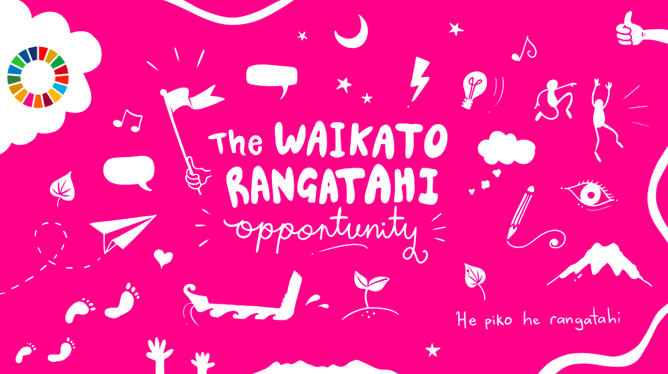E aku iti, e aku rahi, tēnā koutou
Welcome Joe Wilson!
On Tuesday 26 April a powhiri was held to welcome Joe Wilson to the Waikato Wellbeing Project as our Lead Social Innovator.
The powhiri was held at ZEAL in Hamilton and was an amazing gathering of many of the people connected to and supportive of the Kaupapa of the WWP. The event also showed the depth of connection and care that Joe brings to the project, which we are so humbled to have on board. A big mihi to Tony O’Rourke from ZEAL for hosting us, Norm Hill for leading the powhiri and Jami Dickson and Te Wananga O Aotearoa for sharing Joe with us.
Joe has come to us from Te Wananga O Aotearoa where he was an Education to Employment Broker. Prior to that he was a Youth Development Advisor for the Waikato District Council. Joe spent five years travelling the world, using his talent as a singer-songwriter to connect with people from a wide variety of lived experiences, deepening his understanding of the power of finding common ground to unite and communicate with people through empathy and understanding of others’ perspectives. This journey led Joe to study for a Master’s in Human Rights and Social Development, at the University of Sussex, where he explored the SDGs as a framework for revitalising the education system. Joe is also an experienced schoolteacher and sports coach.
Joe describes himself as a big picture thinker, a creative, a dreamer with endless optimism but with a realists’ pragmatism, experience and understanding of the world. His ambition is to connect people, sectors and industries, working together to build a better world for our future generations.
Joe will bring an enormous amount of talent, energy and aroha to the WWP. His first area of focus will be to support and co-lead the next steps for our Rangatahi Opportunity Project. Joe will further deepen the project’s connections with youth leaders across the Waikato, building on the insights we have developed so far, and connecting these with existing and new innovations to improve rangatahi wellbeing.
But that is just the start!- with his passion, energy and experience, except to see Joe popping up in many places across the region as we grow the wellbeing movement.
Rangatahi Opportunity Project Update
On 6 April we connected online with over 70 people to present our emerging insights. Through combining data, lived experiences and research the team have identified five emerging themes. These themes will be used to create “How Might We” questions to frame our co-design hui with collaborators, ranagtahi and whānau in the next phase of our journey.
1. Rangatahi want to give back to their whānau, community and future generations.
A strong theme that came through our empathy interviews was the desire for rangatahi to give back to their whānau, local and global community. Our research also determined that rangatahi place great importance in giving back to their whānau. This challenges the misconception that rangatahi are self-serving or driven specifically by a need for wealth alone.
2. The lives of rangatahi are enhanced when a kaiārahi supports them to navigate life, not just as a one-off, but along the journey.
Rangatahi need a sense of belonging to thrive | Rangatahi want their strengths + cultural identity to be recognised an supported. Rangatahi talked about the various influencers in their lives. Whilst most referenced whānau as a core influence and support we also heard of examples where teachers, mentors and sport coaches playing a key role in supporting rangatahi through life.
3. For some of our rangatahi, environments such as school and work, were often not culturally affirming.
Many spoke about not feeling as if their environment reflected their culture and/or identity. These environments weren't places/spaces where rangatahi felt a great sense of belonging. In many cases we heard that school and work were often experiences which did not empower them.
Some rangatahi felt the need to dissociate from who they are and where they come from in order to "fit in" to the cultural norms of school.
4. Rangatahi feel unprepared when leaving school.
The (lack of) careers guidance, connections to the real world of work and the inability to contextualise learning did not adequately prepare rangatahi for life after school. This was further supported by interviews with advisors who commented on a disparity between youth and employer expectations.
The literature review also identified that "there is lack of responsibility, accountability, and coordination amongst the multiple players in the education to employment journey". - Auckland Codesign Lab, 2017
5. Rangatahi experience barriers due to the effects of structural inequities.
Our research defined that structural inequities reduce young people’s ability to participate in systems of education, as well as in employment, health, and civic society. This is further evidenced within education outcomes for rangatahi where
"School leavers from the most socioeconomically disadvantaged schools are more likely to leave school with no or lower qualifications." - Te Ngira Report.
In addition, the literature review commented on the impact of toxic stress environments on the cognitive development of tamiriki, where The Southern Initiative found that “the five most common risk factors for vulnerability for households with two-year olds is living in deprivation, income tested benefit, highly stressed by money problems, crowded households and maternal depression” (The Southern Initiative, 2017, p.7).
Intergenerational links Intergenerational links to income inequity, associated with systems failure for Māori and Pacific whānau, have also been identified, with mothers receiving a benefit increasing the likelihood of rangatahi receiving a benefit themselves (Vodafone Foundation NZ, 2021).
These factors have a significant impact on the ability for effected rangatahi to participate positively in learning and schools.
"The failure of the education system has led to low expectations for Māori and Pacific performance and achievement, practices such as class streaming, has denied opportunities for Māori and Pacific rangatahi to participate in meaningful career pathways.
In essence, the education system still “carries a racist legacy where Māori culture is seen as a barrier to success and Māori are channelled into unskilled labour." - The Southern Initiative & Waikato Tainui, 2019


